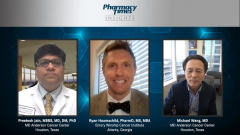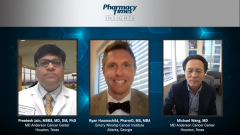
Pipeline Treatments for Patients With MCL
Drs Haumschild, Jain, and Wang evaluate MCL therapies under investigation and the impact on the future of MCL treatment.
Episodes in this series

Ryan Haumschild, PharmD, MS, MBA: Throughout this entire segment, we have been talking about an exciting future for mantle cell lymphoma. We talked about some of the next-generation BTK [Bruton tyrosine kinase] inhibitors. But I’d like us to touch on a few of the different therapies that I see coming that will be impactful to the treatment paradigm. I’m talking about bispecific T-cell engager antibodies, BiTEs. That’s going to be a huge area across a lot of hematology. Even my multiple myeloma colleagues are excited about those being included.
Specifically for mantle cell, another exciting option is BTK-targeted protein degraders. Lastly, we’ve seen a lot of antibody-drug conjugates in the solid tumor side in breast cancer, but we’re now seeing antibody-drug conjugates coming into mantle cell lymphoma. If you could, speak to these 3 categories or add in others that you think are appropriate about the future of some of these newer agents under investigation for mantle cell lymphoma.
Michael Wang, MD: PROTAC [proteolysis targeting chimera] technology is one of the most useful technologies where we can link the target of intention through the linker with a proteomic unit, E3 ligase, so that many of the intracellular targets that aren’t targetable could become targetable. There are several BTK degraders being studied in clinical trials. So far, none of them have mature data or even preliminary data to report. We look forward to the data coming out from these trials. BTK degraders have a promising future.
In terms of antibody-drug conjugates, I reported on zilovertamab vedotin, which has a good efficacy in large cell lymphoma, especially in patients with mantle cell lymphoma or large cell lymphoma who previously failed CAR [chimeric antigen receptor] T- or CAR NK [natural killer]-cell therapy. Zilovertamab vedotin is an ROR1 drug conjugate, with the toxin being MMAE. We also have polatuzumab, which is approved for large cell lymphoma and is being evaluated in mantle cell lymphoma.
There are quite a few bispecific antibodies. A good example is mosunetuzumab, which has a very good toxicity profile and acceptable efficacy. We have epcoritamab in clinical trials, and I’m sure we’ll have the data someday. Antibody immunoconjugates and bispecific and even trispecific antibodies are very promising. In the past, we thought that bispecific and trispecific antibodies were the poor man’s CAR T cells, and we underestimated them. In fact, those can be very effective, but it can cause severe CRS [cytokine release syndrome] and neurotoxicities. Their efficacy and toxicity could be underestimated.
We’re in the infancy of CAR T-cell therapy. We have only 1 CD20 approved. We’re working on more anti-CD20s, and we know ROR1 CAR T cells are being evaluated in ongoing clinical trials. We hope there will be a trial at [the University of Texas] MD Anderson [Cancer Center] pretty soon. There are many others, like CD79b CAR T cells and numerous CD22, CD19, and CD20 CAR T cells that are coming up. There are also tandem and dual CAR T cells coming up. There’s so many of them.
We’re not only entertaining mainly autologous CAR T cells. There are allogeneic CAR T cells and allogeneic cord blood–derived NK cells that have shown good efficacy in some cases of mantle cell lymphoma. There are even more that my laboratory is working on in NKT [natural killer T] cells. An NKT cell is a subtype that also has T-cell properties. It has been shown in clinical trial to be effective in large cell lymphoma. NKT cells are another new cell type that’s bringing forth some promising perspective in the future. It’s a very active area in immunotherapy and cell therapies.
Ryan Haumschild, PharmD, MS, MBA: Dr Jain, what are your thoughts? What do you think the implications of all these pipeline medications and treatments are going to be for mantle cell lymphoma? We have a lot of patients, pharmacists, and providers tuning in. How do you feel these newer therapies are going to impact the treatment landscape for patients with mantle cell lymphoma?
Preetesh Jain, MBBS, MD, DM, PhD: In a very positive manner. Clearly, this is a very important aspect in clinical research in mantle cell lymphoma. Because by development of these new agents and newer mechanisms of abrogating the mantle cell lymphoma propagation, we’re trying to overcome the resistance that these cells have inherently or due to extrinsic factors. The other thing would be to look at the adverse effect profile of these agents and how we can sequence them in an individual patient.
Clearly, the follow-up of all these studies is shorter, but we’re still able to see responses, even in patients who are resistant to CAR T, as Dr Wang mentioned about zilovertamab. There are some responses seen in very highly refractory mantle cell lymphoma. One of the parameters that people should look into is the duration of response and the median follow-up of these studies. There was also a report on the bispecific antibody glofitamab, but the follow-up is only 6 months. Clearly, there’s improvement from going one after another. In CAR T cells, there’s tremendous research. As far as sequencing these CAR T cells, maybe it’s ideal early in combination with BTK inhibitors. But the toxicity and adverse effect profile are unknown. We have to look into the clinical trial data very meaningfully and in an individual patient point of view and then justify it. It’s a very positive approach.
Transcript edited for clarity.
Newsletter
Stay informed on drug updates, treatment guidelines, and pharmacy practice trends—subscribe to Pharmacy Times for weekly clinical insights.





























